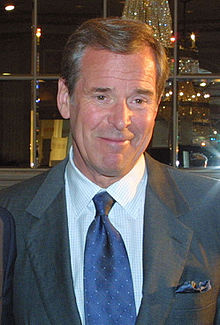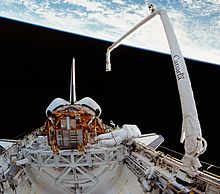
Portal:Canada
| Showcase | Contents | Contributing |
Introduction
Canada is a country in North America. Its ten provinces and three territories extend from the Atlantic Ocean to the Pacific Ocean and northward into the Arctic Ocean, making it the world's second-largest country by total area, with the world's longest coastline. Its border with the United States is the world's longest international land border. The country is characterized by a wide range of both meteorologic and geological regions. It is a sparsely inhabited country of just over 41 million people, the vast majority residing south of the 55th parallel in urban areas. Canada's capital is Ottawa and its three largest metropolitan areas are Toronto, Montreal, and Vancouver.

Canada is a parliamentary democracy and a constitutional monarchy in the Westminster tradition. The country's head of government is the prime minister, who holds office by virtue of their ability to command the confidence of the elected House of Commons and is appointed by the governor general, representing the monarch of Canada, the ceremonial head of state. The country is a Commonwealth realm and is officially bilingual (English and French) in the federal jurisdiction. It is very highly ranked in international measurements of government transparency, quality of life, economic competitiveness, innovation, education and gender equality. It is one of the world's most ethnically diverse and multicultural nations, the product of large-scale immigration. Canada's long and complex relationship with the United States has had a significant impact on its history, economy, and culture.

A developed country, Canada has a high nominal per capita income globally and its advanced economy ranks among the largest in the world, relying chiefly upon its abundant natural resources and well-developed international trade networks. Recognized as a middle power, Canada's strong support for multilateralism and internationalism has been closely related to its foreign relations policies of peacekeeping and aid for developing countries. Canada is part of multiple international organizations and forums. (Full article...)

Featured article -

SS Arctic, an American paddle steamer owned by the Collins Line, sank on September 27, 1854, 50 miles (80 km) off the coast of Newfoundland after a collision with SS Vesta, a much smaller French vessel. Passenger and crew lists indicate that there were probably more than 400 on board; of these, only 88 survived, most of whom were members of the crew. All the women and children on board perished. (Full article...)


Featured biography -
Peter Charles Archibald Ewart Jennings CM (July 29, 1938 – August 7, 2005) was a Canadian-American television journalist, best known for serving as the sole anchor of ABC World News Tonight from 1983 until his death from lung cancer in 2005. Despite dropping out of high school, Jennings transformed himself into one of American television's most prominent journalists. (Full article...)


Selected panorama -
National symbol -
Canadarm or Canadarm1 (officially Shuttle Remote Manipulator System or SRMS, also SSRMS) is a series of robotic arms that were used on the Space Shuttle orbiters to deploy, manoeuvre, and capture payloads. After the Space Shuttle Columbia disaster, the Canadarm was always paired with the Orbiter Boom Sensor System (OBSS), which was used to inspect the exterior of the shuttle for damage to the thermal protection system. (Full article...)

Selected vital article -
The music of Canada reflects the diverse influences that have shaped the country. Indigenous Peoples, the Irish, British, and the French have all made unique contributions to the musical heritage of Canada. The music has also subsequently been influenced by American culture because of the proximity between the two countries. Since French explorer Samuel de Champlain arrived in 1605 and established the first permanent French settlements at Port Royal and Québec in 1608, the country has produced its own composers, musicians and ensembles. (Full article...)

Selected picture -
Credit: (Photograph used by permission of the USDA Forest Service.)
Current events
- September 25, 2024 –
- Canadian Prime Minister Justin Trudeau survives a no-confidence vote by a vote of 211–119. (BBC News)
- September 24, 2024 –
- Scientists from the University of Waterloo announce that they have positively identified bones found on King William Island in Nunavut, Canada, as those of James Fitzjames, captain of HMS Erebus during . (CBC News)
- September 20, 2024 –
- Three people are injured in a stabbing attack at a mosque in Châteauguay, Montreal, Quebec, Canada. The perpetrator is arrested and charged. (CTV News)
- September 9, 2024 –
- Finnish-Canadian sportswear mogul Peter Nygård is sentenced to 11 years in prison for sexual assault. (CBC News)
- September 4, 2024 –
- In Canada, New Democratic Party leader Jagmeet Singh announces that he has terminated the confidence and supply agreement his party made with Prime Minister Justin Trudeau's Liberal government in 2022. (CBC News)
- August 27, 2024 – Canada–Mexico relations, Mexico–United States relations
- Mexico suspends all interactions with the Canadian and American embassies in Mexico City due to claimed interference with its independence and internal affairs after both ambassadors criticized reform plans for members of the judiciary, up to and including Supreme Court justices, to be elected by popular vote. (Reuters)

Did you know -

- ... that Brian Fawcett, who would have turned 78 today, taught English to inmates before becoming a full-time writer?
- ... that Angéline de Montbrun by Laure Conan is the first psychological novel written by a French Canadian?
- ... that journalist Bob Moir posed as medical staff on the Canadian Olympic team to report on the Munich massacre?
- ... that Score: A Hockey Musical has been described as "so Canadian it hurts"?
- ... that the Allenby Formation has been called part of a "Great Canadian Lagerstätte"?
- ... that the St. Raphael Provincial Park in Northern Ontario, Canada, is part of the 1,530 km2 (590 sq mi) St. Raphael Signature Site, which is recognized for its natural and recreational values?
- ... that John Neilson, a Scottish immigrant to Lower Canada, became a major publisher and bookseller, and was reportedly "the largest consumer of paper" in the country?

Featured list -
Canada is a federation that comprises ten provinces and three territories. Its government is structured as a constitutional monarchy and a parliamentary democracy, with a monarch as its sovereign and a Prime Minister as its head of government. Each of the country's provinces and territories also has a head of government, called premier in English. Collectively, the federal Prime Minister and provincial and territorial premiers are referred to as first ministers. In French, the term premier ministre is used in both the federal and provincial/territorial contexts. (Full article...)

Main articles
Associated Wikimedia
The following Wikimedia Foundation sister projects provide more on this subject:

-
Commons
Free media repository -
Wikibooks
Free textbooks and manuals -
Wikidata
Free knowledge base -
Wikinews
Free-content news -
Wikiquote
Collection of quotations -
Wikisource
Free-content library -
Wikiversity
Free learning tools -
Wikivoyage
Free travel guide -
Wiktionary
Dictionary and thesaurus
See what we do next...
OR
By submitting your email or phone number, you're giving mschf permission to send you email and/or recurring marketing texts. Data rates may apply. Text stop to cancel, help for help.
Success: You're subscribed now !


































